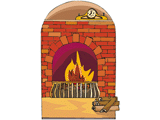I've been reading several books about the ancients so to speak - I became curious when I realized and wanted to know why Germany was only unifying in the mid-nineteenth century when France not only unified a few centuries earlier, I'm still scrounging for exactly when, but more, France already had in the late eighteenth century a major revolution temporarily changing the system from a monarchy - how did France become a unified nation with its own identity centuries before Germany, an adjacent land and people, and they were only attempting to do this in the mid nineteenth century.
Quickly it became apparent that the difference in being part of the Roman Empire as opposed to those who most of us were taught were the Barbarians was a factor - so back to the time in history when these so called Barbarians were breaking down the so called gates of Rome.
That was an eye opener in itself that the fall of Rome took over 100 years - and so I have been reading books - and more books -
The Cambridge Illustrated History of Germany -
Gregory of Tours The History of the Franks -
History of the Goths -
The History of the Lombards -
The Carolingian World -
The Iron Kingdom: The Rise and Fall of Prussia -
Before France and Germany: The Creation and Transformation of the Merovingian World -
The Austrians: A Thousand-Year Odyssey -
Early Medieval Europe, 300-1000 -
Western Society and the Church in the Middle Ages -
The Germanization of Early Medieval Christianity -
Religious Poverty and the Profit Economy in Medieval Europe -
The Knight, the Lady and the Priest: The Making of Modern Marriage in Medieval France -
God's Crucible: Islam and the Making of Europe, 570-1215
I know - how can she be reading that many books at one time - weelll - I read and there is something I need to know more about and so another book is ordered and I read - then go back to the first book and read more and back and forth between these books as I piece it all together - I didn't want an overview provided by an online article or one history that hits just the author's idea of the high spots plus most authors I find are writing from a viewpoint of their research and chronological history where as I was trying to follow a thread of how did lands located next to each other within the borders we associate with these two powerful nations come to unify and then become democratic with such a dramatic difference in timing.
Of course the early history quickly gets into the Holy Roman Empire and the as I call it the pimping by the Monarchs for the Church and the Church for the Monarchs - interesting when we read The Elephant's Journey, King João III of Portugal suggests he cannot read a message from the Archduke Maximilian that at the time I thought it meant he could not read Latin, the language of Art, Law and the Courts - well it turns out he may not have been able to read at all - that was one of the reasons all these monarchs, up through the seventeenth century, had churchmen running their chancelleries, cabinets, especially the office that collected taxes. The monarchs could not read! Fight wars, yes - Read, no!
Turns out many of the monasteries were set up by the monarchs as places for tax collecting, sorting and building the war chest. Another bit, the Church from its conception believed in education - I could go on and on with new knowledge how and why - and so they were needed to write laws, and run the government - and yet another, I finally found the first and reason for a monarchs to be crowned by the Roman Church and actually in partnership with the Church, in many cases their relationship was like a protectorate (think Puerto Rico) by the Church.
Goes back to the magic believed to be breed into the Merovingian royals and in order to top that magical blood so that a more 'with-it' group could take over, Pepin a Carolingian gets Rome to crown him as king - then he gathers other areas so he could be more important and called Emperor of the Holy Roman Empire therefore, he could be on equal footing with the Byzantine Empire. During the Middle Ages the whole of the powerful in the west was in competition and at times at war with the Byzantine arm and beliefs of the Church. Was Jesus God and Man or just God or just Man - based on your belief you were either in the Roman or Byzantine branch of the church or if you lived in the west and believed God either just God or just a man you were a Heretic doomed to be extinguished. This is state stuff not just church stuff.
This concept of church being the state and the state being the church is so foreign to us that it is difficult to grasp until I start looking closer at the news coming out of the middle east - that has been my benchmark to understand. I had no clue how culturally rich, distinct and intelligent were the group we lumped as Barbarians. The Celts are another whole branch of all this but they moving west across northern Europe did not put as big a thumb print on the land today we call Germany.
This is fascinating stuff and I love knowing how come and when and how did that happen and where did that come from.
